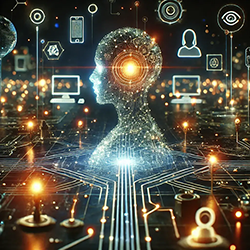As we look to the future, the potential of AI continues to grow, promising even more revolutionary changes.
Advancements in AI Technology
Deep Learning and Neural Networks
Deep learning, a subset of machine learning, uses neural networks with many layers to analyze various factors of data. Future advancements in this area will enhance the ability of AI systems to understand and process complex patterns in data, leading to more accurate predictions and decision-making.
Quantum Computing
Quantum computing holds the potential to exponentially increase computing power, allowing AI to solve problems that are currently intractable. This could revolutionize fields such as cryptography, materials science, and complex system simulations.
AI in Healthcare
Personalized Medicine
AI will enable more personalized treatment plans tailored to individual genetic profiles and health histories. Machine learning algorithms can analyze vast amounts of data to predict the best treatment options for patients.
Early Disease Detection
AI-powered diagnostic tools will improve early detection of diseases such as cancer, Alzheimer’s, and cardiovascular conditions. These tools will analyze medical images, genetic information, and other data to identify signs of disease long before symptoms appear.
AI in Transportation
Autonomous Vehicles
Self-driving cars are becoming a reality, with companies like Tesla, Waymo, and Uber leading the way. Future advancements in AI will make these vehicles safer and more efficient, reducing traffic accidents and improving urban mobility.
Smart Infrastructure
AI will play a crucial role in developing smart infrastructure that can manage traffic flow, reduce congestion, and improve public transportation systems. Intelligent traffic management systems will use real-time data to optimize traffic lights, reduce wait times, and lower emissions.
AI in Education
Adaptive Learning Systems
AI-driven adaptive learning systems will provide personalized educational experiences for students. These systems will tailor content and pace to individual learning styles and needs, improving educational outcomes.
Virtual Tutors
Virtual tutors powered by AI will assist students with homework, provide additional explanations, and offer personalized feedback, making education more accessible and effective.
AI in the Workplace
Automation of Routine Tasks
AI will continue to automate routine and repetitive tasks, allowing employees to focus on more complex and creative work. This shift will increase productivity and lead to the creation of new job categories that leverage human skills and creativity.
AI-Driven Decision Making
AI will enhance decision-making processes by providing insights derived from data analysis. Businesses will rely on AI to forecast trends, optimize operations, and identify new opportunities for growth.
Ethical and Social Implications
Bias and Fairness
As AI systems become more prevalent, ensuring they operate fairly and without bias will be crucial. Future research and development will focus on creating transparent and explainable AI systems that can be audited for fairness and accountability.
Privacy and Security
The widespread use of AI raises concerns about privacy and security. Future AI systems will need to incorporate robust data protection measures to safeguard personal information and prevent misuse.
Job Displacement and Workforce Transformation
While AI will create new job opportunities, it will also displace certain roles. Preparing the workforce for this transformation through reskilling and upskilling initiatives will be essential to mitigate the impact of job displacement.
AI and the Environment
Climate Change Mitigation
AI can play a significant role in addressing climate change by optimizing energy use, reducing waste, and predicting environmental changes. AI-driven solutions will help monitor deforestation, track wildlife populations, and model climate patterns to inform policy decisions.
Sustainable Practices
AI will enable more sustainable practices in agriculture, manufacturing, and supply chain management. For example, precision agriculture powered by AI can optimize water usage, reduce pesticide application, and increase crop yields.
The future of artificial intelligence is bright, with the potential to transform every aspect of our lives. As AI technology continues to evolve, it will bring about significant advancements in healthcare, transportation, education, and beyond. However, addressing the ethical and social implications of AI will be crucial to ensure that these advancements benefit all of humanity. By embracing AI responsibly and thoughtfully, we can unlock its full potential and create a better future for everyone.




Comments (0)